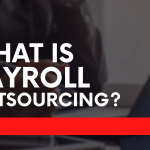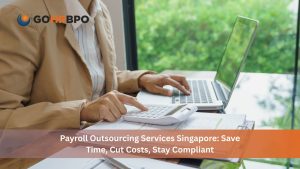Look to Outsource your payroll? Yes, it can be a smart move, offering relief from tedious calculations, compliance headaches, and freeing up valuable time. However, like any major business decision, it’s not about simply signing on the dotted line. Let’s dive into some key things you need to consider to ensure a successful payroll outsourcing experience.
Define Your Goals & Expectations
Before you start searching for a provider, get crystal clear on why you want to outsource your payroll. Consider:
- Pain points: What are the specific challenges you face with your current payroll process?
- Desired outcomes: What do you hope to gain from outsourcing? Is it time savings, accuracy, compliance support, or all of the above?
- Scope of services: Do you need basic payroll processing or a more comprehensive solution including tax filing and HR support?
Choosing the Right Provider
Finding the right fit is crucial for a successful partnership. Focus on these areas when evaluating potential providers:
- Experience & Reputation: How long have they been in business, and do they have expertise in your industry and company size? Check client testimonials and reviews.
- Technology & Systems: Do they offer cloud-based solutions, employee self-service, and the reporting tools you need?
- Security & Compliance: What are their safeguards for protecting sensitive data and ensuring adherence to tax regulations?
- Pricing & Contract Terms: Are their fees transparent? Be clear on the services included and any additional costs.
- Customer Support: Will you have a dedicated contact, and how responsive are they to questions or issues?
Preparing for a Smooth Transition
Outsourcing your payroll requires careful planning. Here’s what to keep in mind:
- Data Migration: Work with your chosen provider to securely transfer employee data into their system.
- Communication is Key: Keep your employees informed about the change, how to access their pay information, and who to contact with questions.
- Parallel Testing: Consider running your old system alongside the outsourced one for a cycle or two to ensure accuracy.
- Ongoing Collaboration: Maintain open communication channels with your provider for smooth operations and addressing any questions.
Other Factors to Consider When You Outsource Your Payroll
- Scalability: Will the provider grow with your business as you hire more employees or expand benefits?
- Control vs. Flexibility: How much control do you want to retain over payroll processes versus outsourcing completely?
- Company Culture Fit: Does the provider’s style and values align with your own?
The Importance of a Well-Managed Transition
The transition to outsourcing your payroll is a critical phase. Beyond the technical aspects of data migration, focus on these areas for a smooth changeover:
- Change management: Proactive communication with your employees about the transition will ease concerns and minimize disruptions. Provide clear instructions and timelines.
- Anticipate questions: Prepare for common employee questions about accessing paystubs, updating information, and who their new point of contact is for payroll concerns.
- Testing and verification: Running parallel payroll systems and thoroughly comparing results builds confidence in the accuracy of the outsourced process.
- Phase-in approach (if needed): For complex payrolls, consider a staggered transition, starting with a subset of employees and gradually onboarding the entire team.
Building a Strong Partnership: The Value of Ongoing Collaboration
Outsource your payroll the way it should be It isn’t a “set it and forget it” situation. Building a strong partnership with your provider requires ongoing collaboration. Consider:
- Regular check-ins: Schedule periodic meetings to review performance, address any issues, and discuss changes in your business that might impact payroll.
- Proactive communication on your end: Keep your provider informed of new hires, terminations, benefit changes, etc., to ensure payroll is continually updated.
- Responsiveness is key: Ensure your provider has clear channels for addressing questions or issues that arise between scheduled reviews.
- Adapting to changes: As your business evolves, your payroll needs may too. Choose a provider committed to flexibility and adjusting their services alongside your growth.
Conclusion
If you outsource your payroll the right way, then you can streamline operations, save you time, and reduce stress. By carefully defining your needs, choosing the right partner, planning a seamless transition, and nurturing an ongoing collaborative partnership, you can maximize the benefits of outsourcing. Remember, thorough evaluation, a well-managed transition, and continuous communication are keys to building a successful relationship with your payroll provider.
If you’re ready to simplify your payroll processes, regain your time, and ensure peace of mind, GOHRBPO is here to help. Our experienced team is dedicated to providing accurate, compliant, and streamlined payroll solutions that scale with your business. Contact us today and discover how we can outsource your payroll from a burden into a seamless operation.






